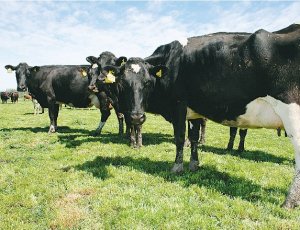Crankiness in cows often results directly from perennial ryegrass toxicity, he says. "Affected cows will be temperamental and tend to strike out, kick the cups off and be frightened easily."
Toxins produced by ryegrass endophytes – more prevalent in older pastures – are to blame for such irritability, as well as the better recognised symptoms of staggers, heat stress, lower feed intake and reduced milk production.
Moore says New Zealand dairy farmers lack knowledge of this, an issue DairyNZ could more actively address.
'Cranky cow' syndrome is a much misunderstood and misdiagnosed problem in New Zealand, he told Rural News. "It is a seasonal problem, occurring usually when soil temperatures rise in October/November. It will normally start in the north and move south during November and December. It is about the same time as the ryegrass goes to head.
"What most farmers probably know is 'staggers' caused by the endophyte, but this will normally happen later in the season – February/March."
The endophyte is a microscopic fungi which grows between the cells of the plant. Its symbiotic relationship protects the plant against insects, nematodes and drought. But there is "an unfortunate side". In protecting the plant it produces toxins including ergovaline and lolitrom-B.
Moore says ergovaline tends to rise early in the season and is responsible for much cranky cow behaviour.
"Work by Lincoln shows animals fed a diet free from ergovaline could graze in temperatures about 40˚C, yet when the toxins were introduced this temperature reduced to about 23˚C.
"Ergovaline will also act similar to a neurotransmitter, hence all the problems associated with temperament, udder sensitisation. It also prevents the production of prolactin, a hormone needed for the production of milk. Local work has shown there could be up to a 9% reduction in milk production when cows graze an endophyte positive pasture."
Other problems associated with ergovaline include lower feed intake (cows put in a paddock with what appears plenty of feed do not eat much of it), scouring (cows tend to be very loose when, in fact, the manure should be firm when grazing a high fibre diet), and ergovaline has also been associated with increases in cell counts.
Lolitrom-B is a neurotoxin responsible for causing the staggers in animals. It will also affect the white muscle movement and feed digestion.
Moore points out New Zealand leads the world in pasture research with the introduction of the novel endophyte like AR1 and AR37. Although these reduce the production of some of the toxins, a specific programme is needed for re-grassing to prevent 'wild' endophyte types re-emerging.
"There have also been some questions about the persistence of these [novel endophyte] pastures, particularly when faced with long dry conditions," Moore says.
An alternative to reduce the impact and severity of the toxins is using binder. "Binders will actually bind to these toxins in the feed and prevent the animal adsorbing them thus reducing the effect."
Moore's company Meriden Animal Health's product Fusion is a new generation mycotoxin binder which contains a cliptinolite that can help reduce the direct effects of perennial rye grass toxicity.
Moore admits the product is not a magic bullet but commercial field results on dairy and sheep farms in Australia and New Zealand show a decrease in symptoms associated with ryegrass toxicity 24-48 hours after treatment.
Fusion contains inorganic and organic binders which lock onto 95% of the ergot alkaloids in vitro.

















